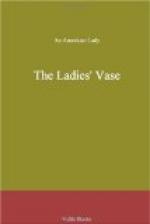toothpicks, is a common ornament on the dining tables
of Spain and Portugal. The general use of them
creates so large a demand, that students at Coimbra
sometimes support themselves by whittling toothpicks,
which are sold tied in small bunches like matches.
They are made of willow, on account of its toughness
and pliability. Toothpicks of metal are too hard,
and are apt to injure the gums. There is the
same objection, in a less degree, to quills. But
willow toothpicks are preferable to all others; and
they have the advantage of being the most cleanly,
for they generally break in the using, and are thrown
away. Few sights are more offensive to a person
of any refinement than a toothpick that has been much
used; it is, moreover, uncleanly, and therefore not
healthy for the teeth. Food allowed to remain
between the teeth, particularly animal food, is very
destructive: it should be carefully removed after
every meal, and the mouth thoroughly rinsed.
This may seem to some like a great talk about a small
matter; but these are simple precautions to take, and
very slight trouble compared with the agony of aching
teeth, or a breath so offensive that your best friend
does not wish to sit near you. I can see no reason
why a man’s complexion should exclude him from
the dining-table, but I do see a very good reason
why he should be banished for not taking proper care
of his teeth. A bad breath is such a detestable
thing, that it might be a sufficient reason for not
marrying a person of otherwise agreeable qualities.
It is, moreover, perfectly inexcusable thus to transform
oneself into a walking sepulchre. Nobody needs
to have an offensive breath. A careful removal
of substances from between the teeth, rinsing the
mouth after meals, and a bit of charcoal held in the
mouth, will
always cure a bad breath. Charcoal,
used as a dentifrice—that is, rubbed on
in powder with a brush—is apt to injure
the enamel; but a lump of it, held in the mouth, two
or three times in a week, and slowly chewed, has a
wonderful power to preserve the teeth and purify the
breath. The action is purely chemical. It
counteracts the acid arising from a disordered stomach,
or food decaying about the gums; and it is the acid
which destroys the teeth.
Every one knows that charcoal is an antiputrescent,
and is used in boxing up animal or vegetable substances,
to keep them from decay. Upon the same chemical
principle, it tends to preserve the teeth and sweeten
the breath. There is no danger from swallowing
it; on the contrary, small quantities have a healthful
effect on the inward system, particularly when the
body is suffering from that class of complaints peculiarly
incident to summer. It would not be wise to swallow
that or any other gritty substance, in large quantities,
or very frequently; but, once or twice a week, a little
would be salutary, rather than otherwise. A bit
of charcoal, as big as a cherry, merely held in the
mouth a few hours, without chewing, has a good effect.
At first, most persons dislike to chew it, but use
soon renders it far from disagreeable. Those
who are troubled with an offensive breath might chew
it very often and swallow it but seldom. It is
particularly important to clean and rinse the mouth
thoroughly before going to bed; otherwise a great
deal of the destructive acid will form during the night.




